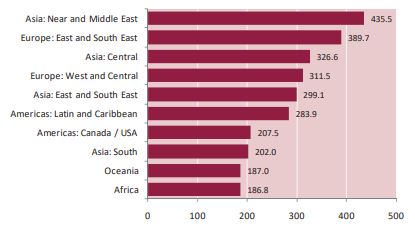You don’t have to be an online arsonist, hacker, or international cyber-terrorist to hide your online identity. Likewise, concealing your PC’s web address or your Internet Protocol address (IP address), making it unknown to the public, does not necessarily mean you are up to no good online.
We will, therefore, build a case for why it is important at times to conceal your private online location using VPNs (Virtual Private Networks).
A VPN is a connection method used to add security and privacy to your private and public networks. This includes your Wi-fi Hotspots and access to the Internet. They are most often used by corporations to protect sensitive data but now also by people like yourselves for the same purpose.

Click on the image to view a quick video
Let’s get back to the importance of your IP address. It is probably something you rarely think about but is crucial to your online lifestyle even as an individual. How so? You might still ask.
Well, without an IP address, you wouldn’t be able to get the current weather, check the latest news, or view videos (streaming) online for instance.
The uses of VPNs
Your IP is also used to access every online service you partake in including very private things like your internet/mobile banking or online trading activity. Think of it as your physical address and how important it is when getting things delivered by post or using it when you need to make applications for loans, jobs, etc.
“Without a public IP address, online service providers like Netflix, BBC, or Amazon wouldn’t know where to send the information you asked for. They wouldn’t be able to get it to your computer.”
Imagine how naked you must feel if you have nothing to protect this address from the advent of a hack without adequate data encryption. Also the just the haggling by overzealous online marketers, spam, malware, and even ‘419 scammers’!
Now the argument for whether using VPNs is illegal is highly debatable for some of the valid reasons highlighted above. It should, however, be a given right to be able to use it. And even though it is commonly used by cyber-thugs to mask their clandestine and often dark activities, it should not be outlawed altogether.
The case for VPN
The legitimacy of VPNs debate, therefore, carries on into a grey area.
We will, however, investigate a few VPN providers that are ‘paid for services’ and even offered by established companies such as AVG (which primarily offers Antivirus protection).
The directive is to help the everyday consumer surf the web without ‘virtual’ salespeople bombarding them with offers based on personal information gathered in an ‘unsolicited’ manner.
Policies like the European-based GDPR law were put in place to protect consumers from the non-consensus use of their data. Even your Internet Service Providers (ISPs) can track your online activities via your IP and sell your browsing habits.
Some forward-thinking people and companies, however, have long been shielding themselves manually using VPNs.
One direct benefit for you as a consumer is the ability to access content (information, products, and services) from different servers. A good VPN service can enable you to obtain access to other geo-locational content despite being on a different continent.
It is perfectly legal provided you are paying for the service. The burden falls on the provider of the service and not you if it came down to a legal “scrap”.
Rationale for using them
If you perform these tasks frequently, you need a VPN:
- Hide your IP address (to enable anonymity from marketers and hackers)
- Change your IP address (to avoid identity theft)
- Encrypt data transfers (private and financial data)
- Mask your location (to access other services)
- Access blocked websites
A word of caution when navigating websites blocked by governments with a VPN. Unless you are a high-profile journalist working on a case and backed by good legal aid – it’s not a wise thing to do.
Do some research if you are not sure because accessing such sites could land you in some hot water. Rather use a known privacy service like Tor to ensure full anonymity to gain access to restricted sites if you really must.
Top Virtual Private Network Protocols
VPN protocols and available security features are numerous. The most common (best) protocols are:
ExpressVPN – the acclaimed best offshore VPN for privacy and unblocking.
IPVanish – great for P2P and Torrenting.
VyprVPN – the best choice for those looking for security.
NordVPN – security is its middle name.
TunnelBear – dubbed the easiest VPN to use.
Windscribe – a VPN which gives you unlimited connections.
Hotspot Shield – an awesome solution for online browsing.
KeepSolid VPN Unlimited – the jack of all trades of VPNs.
CyberGhost – rich clients and ease of reconfiguring.
ZenMate – user-friendly VPN that caters to the newbies to VPN.
PureVPN – take advantage of easy to use apps and access to many servers.
Source: www.itproportal.com, PureVpn
Making the choice
Picking a VPN service can be a daunting task as there are now literally hundreds of them to choose from. Landing the right one means striking the right balance between what you are offered, the ease of use, and naturally, the price.
Some providers offer free you VPN services while some like AVG charges for their VPN service. Paid VPN providers, however, are preferred to the free service providers as they offer robust gateways, proven security, additional free software, and unmatched speed.









